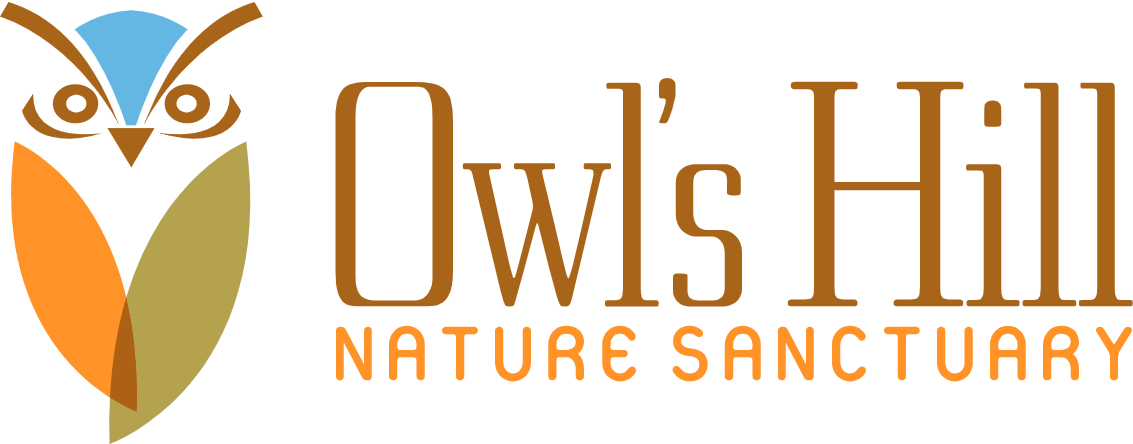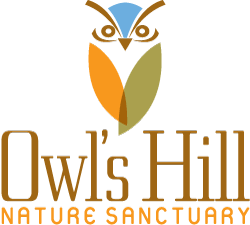Help for Orphaned or Injured Wildlife

Owl’s Hill Nature Sanctuary is dedicated to preserving habitats for Tennessee Wildlife. We hold state and federal permits that allow us to keep a small number of non-releasable native animals onsite that serve as wildlife ambassadors. Owl's Hill is not a licensed wildlife rehabilitation facility and cannot admit, house, or transport orphaned or injured wildlife.
Seek immediate help from a licensed wildlife rehabilitator for:
- Any animal that has been exposed to dog or cat saliva. Even small bites are susceptible to a deadly bacterial infection.
- Any animal with a visible wound, broken bone, or other trauma.
- Any animal that is lethargic or does not avoid or try to escape from humans or predators.
- A juvenile animal found with a dead mother.
- A juvenile animal that approaches humans or cries excessively.
What to do if you have found an animal in need of help
Do not feed the animal. Inappropriate or improperly administered food or water can cause irreversible harm. Do not provide food or water to an animal you have found unless instructed to do so by a licensed rehabilitator. Homemade formula recipes found online and commercial pet milk replacers are inappropriate for wildlife. Animals that are injured or have been without food often need special diets as they recover.
Avoid prolonged or unnecessary contact with the animal. Inappropriate handling can cause harm to the animal and can expose you to disease or injury. Contain wildlife in a box or pet carrier lined with a towel or blanket. Keep in a quiet, dark place away from domestic animals and human activity until it can be transferred to a licensed rehabilitator. Do not hold or pet wild animals. Your scent and touch are unfamiliar to them and can cause extreme stress, even if they appear calm or tame.
Please know that just because a juvenile animal is on its own, it is not necessarily orphaned.
2023 Update to wildlife rehabilitation laws: Tennessee wildlife rehabilitators cannot accept white-tailed deer of any age.
White-tailed deer also conceal their fawns until they are old enough to follow their mother. The doe (mother) visits during the night to care for and nurse her baby. Fawns should be left alone - in almost every case a doe is nearby caring for the fawn.
Owls fledge (leave the nest) before they are fully able to fly. They will spend a few days on branches near the nest and may hop from branch to branch. Sometimes they will end up on the ground, and will usually be found at the base of a tree with the parents nearby providing food and protection. Fledglings may be partially feathered but are capable of sitting upright like an adult owl. Some may be capable of climbing the tree to safety. Keep children and pets away from the owl, and be aware that adult owls can be very territorial around their nest. This site has more information about helping young owls, as well as pictures of what a fledgling owl should look like.
Songbirds and doves may also fledge (leave the nest) before they are able to fly. The parents remain nearby and continue to feed the chick. A fledgling that is fully feathered (tufts of down feathers may still be visible on the head), active, and does not appear to be injured should be left alone.
Eastern cottontail rabbits conceal their young in nests lined with grass and fur. The doe (mother) comes at dawn and dusk to nurse the kits (babies). If the nest is disturbed by a pet, but the young are uninjured, replace nesting material, place the young in the nest, and cover them with dry grass.
Squirrels and raccoons may have multiple nests, and the mother may move her young between nests, especially if one has been damaged or disturbed. If you see a baby squirrel or raccoon out of its nest, leave the area and allow the mother time to finish moving the litter. If she has not returned after two hours, contact a licensed rehabilitator.
Animals that are normally nocturnal (active primarily at night) may be active during the day in the spring and summer. It is normal for
skunks, opossums, and raccoons to forage during daylight hours because of increased calorie needs while they are pregnant or nursing.
Coyotes and foxes are not strictly nocturnal and may be seen during the day throughout the year. If you see an animal that appears to be stumbling, uncoordinated, or disoriented, contact your local animal control office.
For assistance with orphaned or injured wildlife, please reach out to a licensed wildlife rehabilitator for advice on safely renesting, containing, or transporting the animal.
Some Wildlife Rehabilitators in the Middle Tennessee:
- Walden’s Puddle (615) 559-9453 (leave a voicemail)
- Harmony Wildlife Rehabilitation (615) 266-5701
- Lillie Birds 615-579-8801 (small mammals only) - text a picture and description of the animal
- Ziggy’s Tree (931) 841-9781 (birds) or (615) 642-3723 (turtles)
Click here for a full list of licensed rehabilitators in the state of Tennessee.
Always use caution when attempting to capture or contain wildlife. If you are bitten or scratched by a wild animal, seek medical attention immediately.


